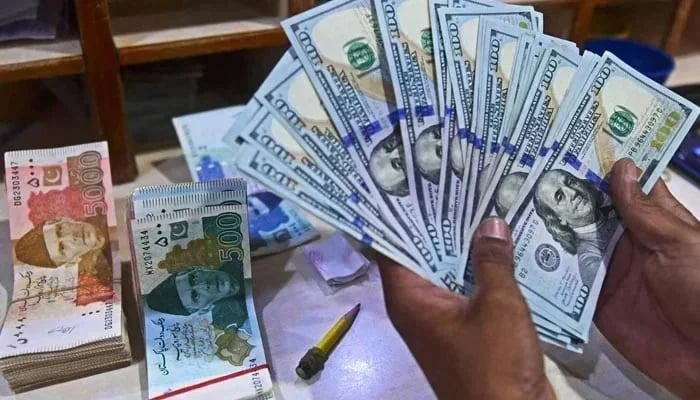Pakistan notes gained 9 percent last month, catapulting them among the best in the world  This image shows the US dollars along with the Pakistani currency. — AFP/File
This image shows the US dollars along with the Pakistani currency. — AFP/File
Manila: The rally in Pakistan’s dollar bonds, Asia’s top performer in January, is set to face hiccups as investors await a new leader to strike a funding deal with the International Monetary Fund to keep the economy afloat.
After handing over investors a return of almost 100 percent in 2023, Pakistan notes gained 9 percent last month, catapulting them among the best in the world. The stellar performance may take a breather as the South Asian nation votes on Thursday to elect a new government, which may negotiate for a fresh IMF bailout as the current one expires in March. “The rise is inexorable, it’s swimming against the tide,” said Edwin Gutierrez, head of emerging-market sovereign debt at Abrdn Plc. in London.
“The caretaker government is doing all the right things, but let’s see what happens when we have a real government. Therein lies the risk as the track record of Pakistani compliance under IMF programs is not great.” Pakistan’s elections come at a crucial time as the nation faces $25 billion of external debt payments in the fiscal year starting July, about three times its foreign-exchange reserves. While the government has taken steps to fix its economy including cutting subsidies and raising taxes, interim Finance Minister Shamshad Akhtar has signaled the nation may need another loan from the IMF. Pakistan has about $1 billion in dollar-denominated bonds due in April. While markets have priced out the risk of default for those notes, the payment will eat into the nation’s dollar stockpile, which totaled $8.2 billion in late January. The nation’s finances will collapse without a fresh bailout, according to all 12 respondents in a recent Bloomberg survey. The Feb. 8 elections are intended to bring an end to the political instability weighing on Pakistan since Imran Khan, who remains a popular leader, was ousted in 2022. He was arrested last year and is barred from participation in the polls. While others in the fray include former foreign minister Bilawal Bhutto Zardari and sugar magnate Jahangir Tareen, Khan’s rival and three-time prime minister Nawaz Sharif has been gaining ground. “Pakistan dollar bonds started the year very well, but have recently seen a small correction,” said Philip Fielding, co-head and portfolio manager of emerging-market debt at MacKay Shields UK, a unit of New York Life Insurance Co. “I would expect volatility to remain high going into the ballot.”
Negotiations for a new IMF deal could be lengthy, with the nation teetering at the edge of a sovereign default for almost a year before clinching the current $3 billion program in July. The country has an uneven track record in meeting the lender’s targets in about two dozen bailouts since 1950. The reforms the IMF is asking include eliminating restrictions on the exchange rate, a strict adherence to the budget, and a tight monetary policy to curb inflation. “There’s still some upside left on the prospect of a smooth government transition, followed by a successful negotiation for a new IMF program,” said Eng Tat Low, emerging-market sovereign analyst at Columbia Threadneedle Investments in Singapore. “The IMF backing is crucial to ensure continued access to multilateral and bilateral funding in order to meet its elevated external financing needs over the coming years.”











